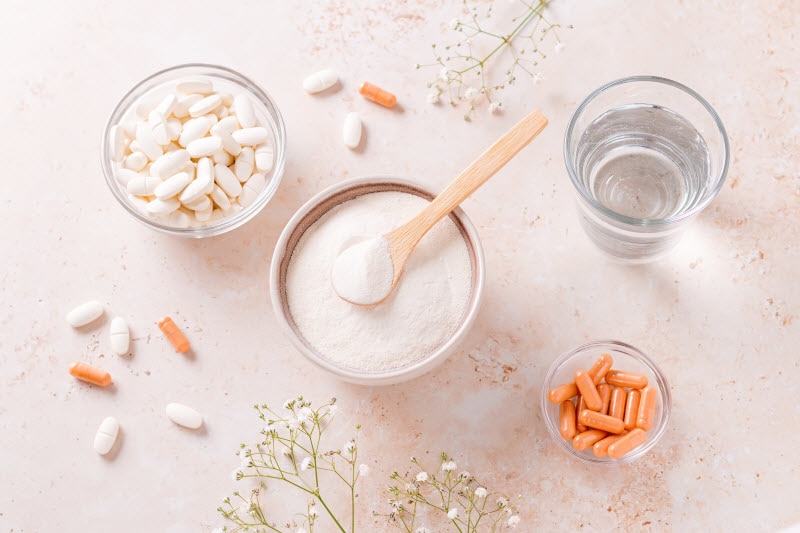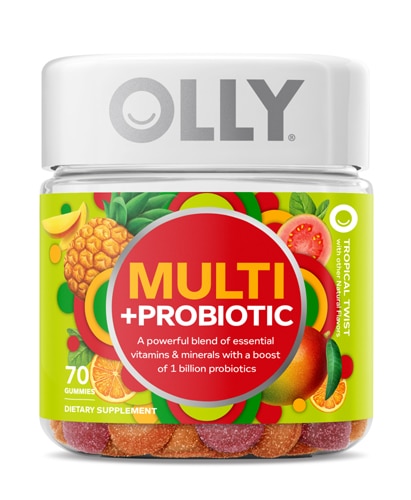[vc_row][vc_column][vc_column_text]
Probiotics and
fiber are often celebrated as superheroes of
gut health, but they don't act alone. Vitamins are also instrumental in balancing your microbiome, improving gut-associated immunity and reducing the risk of inflammatory bowel disease (IBD).

Why you need vitamins for gut health
Your gut is more than a digestion machine. It's lined with a layer of cells called gut-associated lymphoid tissue (GALT), which regulates functions like:
- Training immune cells to recognize pathogens
- Monitoring for and detecting germs and toxins
- Alerting the immune system to invading pathogens
Special cells in GALT, known as M cells, present potential invaders to the immune system. The immune system mounts an attack if a pathogen or toxin is identified. This pro-inflammatory state should return to normal once the invader is removed.
But if your gut doesn't get enough nutrients, your immune system may become overactive. This can lead to chronic inflammation and increased intestinal permeability, commonly known as
leaky gut. A more permeable gut lining allows bacterial byproducts and
foodborne toxins to pass into your bloodstream, triggering more immune activity and
inflammation. Leaky gut may also be involved in the development of some
autoimmune disorders.
A
healthy, diverse microbiome can prevent leaky gut and its associated symptoms. Beneficial microbes produce short-chain fatty acids (SCFAs), which keep your gut lining strong and
reduce permeability. Some vitamins can provide additional support to minimize inflammation, reinforce gut barrier strength and sustain the microbes that produce SCFAs.
†
The most important vitamins for gut health
An
overview published in Nutrition Research gives insight into the roles of some common vitamins in gut health.
Vitamin A is important for cell growth and differentiation—the process by which cells specialize and mature. It also promotes the production of mucin, proteins that line and protect the gut. This may be why adequate vitamin A intake is associated with a healthier, stronger gut barrier. Vitamin A may also have anti-microbial effects that could prevent gut infections and reduce the risk of pathogens passing through the gut wall.
†
B vitamins like B1, B2 and B9 (folate) are often low in people with IBD. In these cases, supplementing with vitamin B2 may reduce inflammation. B vitamins may also be important for the health and survival of gut microbes that produce butyrate, an SCFA that controls inflammation, strengthens the gut lining, and regulates intestinal muscle contractions. Butyrate may have
additional health benefits for people with obesity, high cholesterol and certain genetic conditions.
†
Vitamin C's antioxidant properties may reduce gut inflammation. Some
small studies suggest that it could cause
positive changes in the microbiome, but more research is needed to understand how this vitamin affects overall gut health.
†
Vitamin D may improve gut barrier function and reduce permeability, which can dial down inflammation and autoimmune activity.
Taking a vitamin D supplement when you're deficient may increase microbial diversity to prevent dysbiosis and promote gut health.
†
Vitamin E is an antioxidant with potential anti-microbial properties. This may prevent the formation of biofilms, communities of pathogens that grow inside a protective layer and could contribute to dysbiosis and leaky gut. Vitamin E is also involved in cell membrane repair, which could strengthen the gut lining. More human studies are needed to confirm this effect.
†
The
Nutrition Research review also noted that some vitamins—like A and D—might have a positive effect on the number and types of microbes in your gut, but the results from existing research aren't conclusive enough to show a direct connection.
How to prevent vitamin deficiencies for a healthier gut
Adequate nutrient intake and smart lifestyle choices can help you get the vitamins you need to strengthen your gut lining, reduce inflammation, and prevent dysbiosis.
Gut health vitamin foods and supplements
Whole and minimally processed foods like fruits, vegetables, beans, and whole grains are rich in nutrients and high in fiber—a winning combination for gut health. Here are some of the best sources for your daily vitamin intake:
- Vitamin A: Dried apricots, carrots, sweet potatoes, butternut squash, sweet red peppers, and leafy greens (like kale, collards, spinach, Swiss chard, and dandelion greens)
- Vitamin B complex: beans and legumes (including soy), nuts and seeds, whole grains, mushrooms
- Vitamin C: acerola cherries, broccoli, dark leafy greens like kale and collards, and most brightly colored fruits and vegetables
- Vitamin D: sunflower seeds, some mushrooms
- Vitamin E: almonds, peanuts and sunflower seeds
A note on vitamin B12: Vitamin B12 is only found in animal foods. If you adhere to a vegan diet, supplement with
50 to 250 micrograms of cyanocobalamin per day or
2,000 to 2,500 micrograms per week to prevent deficiency.
Lifestyle habits for better gut health
It's essential to not only eat enough vitamin-rich foods but also avoid habits that deplete vitamins. To maintain the vitamin levels you need for a healthy gut:
Quit smoking.
Your body uses antioxidant nutrients like vitamins C and E to neutralize the free radicals that smoking causes. Smokers also tend to have lower levels of B vitamins like B12 and folate.
Minimize or eliminate alcohol.
Heavy drinking can lower your levels of B vitamins and vitamins A, C, D, and E.
Avoid restrictive diets.
Very-low-calorie diets don't provide enough vitamins for gut health (or health in general). Some restrictive eating patterns may also unnecessarily eliminate entire groups of vitamin-rich foods.
Spend time in the sun.
Sun exposure prompts your body to make vitamin D. To meet your requirements, expose your arms, legs, and face to sunlight without sunscreen for 15 to 30 minutes. If you live in an area where this isn't possible for most of the year, a vitamin D supplement may be necessary to maintain healthy levels.
A note on multivitamins: If you eat a diet high in a variety of plant foods and follow healthy lifestyle patterns, you shouldn't need a multivitamin. However, if you experience symptoms like brittle hair or nails, unusual fatigue, skin problems, or bleeding gums, getting tested for
deficiencies is a good idea. A doctor or nutritionist can advise you on the best way to increase low levels.
†These statements have not been approved by the Food and Drug Administration. These products are not intended to diagnose, treat, cure or prevent disease.[/vc_column_text][/vc_column][/vc_row][vc_row][vc_column][vc_text_separator title="Featured Products" border_width="2"][vc_row_inner equal_height="yes" content_placement="middle" gap="35"][vc_column_inner width="1/3"][vc_single_image image="165754" img_size="full" alignment="center" onclick="custom_link" img_link_target="_blank" css=".vc_custom_1679603115258{padding-right: 7% !important;padding-left: 7% !important;}" link="https://www.vitacost.com/rhythm-superfoods-kale-chips-zesty-nacho-2-oz-1"][/vc_column_inner][vc_column_inner width="1/3"][vc_single_image image="165755" img_size="full" alignment="center" onclick="custom_link" img_link_target="_blank" css=".vc_custom_1679603131532{padding-right: 7% !important;padding-left: 7% !important;}" link="https://www.vitacost.com/terra-origin-healthy-gut-vegan-formula"][/vc_column_inner][vc_column_inner width="1/3"][vc_single_image image="165753" img_size="full" alignment="center" onclick="custom_link" img_link_target="_blank" css=".vc_custom_1679603149391{padding-right: 7% !important;padding-left: 7% !important;}" link="https://www.vitacost.com/go-raw-organic-sprouted-sunflower-seeds"][/vc_column_inner][/vc_row_inner][/vc_column][/vc_row]




